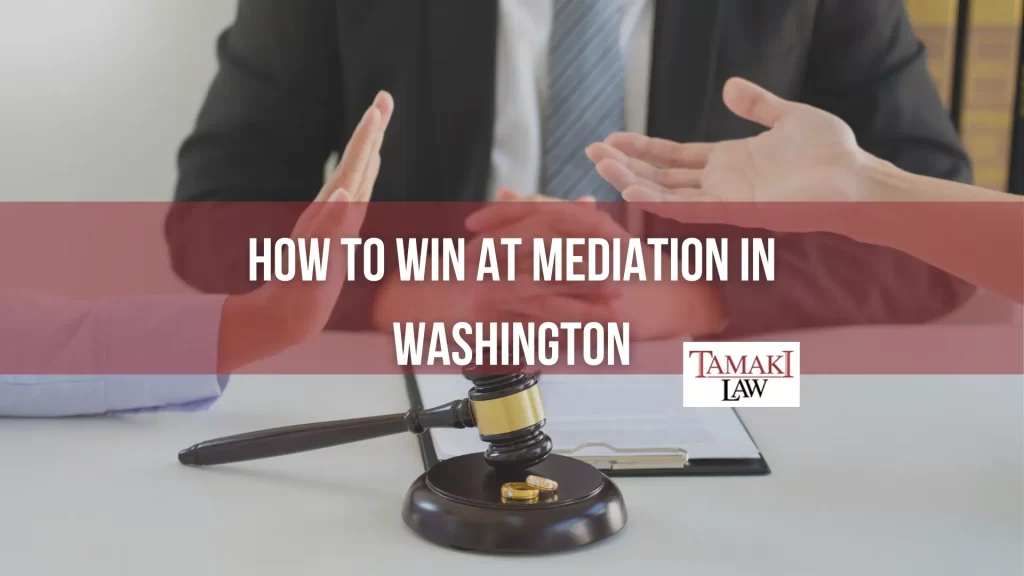
If you recently sustained injuries in an accident, you know the journey ahead can feel daunting. If you’re pursuing compensation for your injuries, mediation might be a key step for you. It’s a chance for you and the other side to meet with a neutral third party to find common ground to reach a settlement agreement. It’s less formal than court, often faster, and gives you more control over the outcome. However, knowing how to win at mediation in Washington State requires experience, strategy, and determination.
For nearly 30 years, the Washington State injury attorneys of Tamaki Law have represented injured people in their battles for justice. That extensive experience has given us a wealth of knowledge regarding mediation and how to win during negotiations. Keep reading to learn some of our secrets to winning at mediation in a Washington injury claim.
The Mediation Process Explained
Before getting into strategies for winning mediation, you need to know how the process works. At the center of this process is the neutral mediator. They don’t make decisions or take sides. Their job is to keep the conversation on track, help the parties understand each other, and foster a productive environment.
A mediation session has three main parts:
- Presentations: This is when you’ll share your story, describe your injuries, and explain how the accident threw your life off balance. The other side will explain their position.
- Discussions: With the mediator’s help, you’ll discuss the details of the case, express concerns, and pinpoint precisely what is needed to move forward.
- Negotiations: This is the give-and-take segment. It’s all about finding that spot where both parties can say, “Yes, that works for me.”
The overall goal? To come to a settlement that everyone can agree on.
Key Strategies to “Win” at Mediation
Winning at mediation is all about preparation, understanding, and intelligent strategy. Here’s how you can gear up for success:
Prepare, Prepare, Prepare
Before you step into the mediation session, do your homework. Collect every bit of evidence, gather your medical records, and line up your case points. You need a rock-solid foundation of facts and figures to support your story.
Know the Other Side
Winning at mediation is not just about the facts; it’s about the people. Recognize who you’re negotiating with and what they need from the mediation. This is your chance to show how the injury has affected your life and listen to their position.
Make the Most of the Middle Ground
The mediator is your ally. They don’t take sides but can shine a light on areas of agreement you might not have seen. Use their neutral position as a bridge between the parties, guiding you and the opposition toward common ground.
By combining thorough preparation, empathy for your opponent, and the mediator’s impartiality, you set the stage for a mediation win.
The Importance of Timing in Mediation
Setting a trial date on the calendar is like setting an alarm for the insurance company. This date signals that you mean business and motivates them to move toward a solution. They know the clock is ticking, which helps light a fire under them because they want to avoid the unpredictability and expense of litigation.
As the trial date nears, you gain more leverage over insurers. The closer you get to this date without a settlement, the more the insurance company might worry about a trial. This is your chance to push for a settlement that meets your needs. You’re showing them you’re ready to go all the way but are open to resolving things now.
Effective Communication: Making a Strong Opening Statement
Your opening statement sets the tone for negotiations and lays the groundwork for everything that follows. It’s your story, your voice, and your pain laid bare. This statement steers the direction of the session and puts everyone on notice that you’re there to find real solutions.
Furthermore, you can use your opening statement to spotlight your evidence and key arguments. You can clarify why you deserve a fair settlement. Highlight your strongest points that will make the insurance company sit up and take notice. It’s about clarity, conviction, and the power of your truth.
Navigating the Mediation Session
 Navigating a mediation session is a lot like playing a strategic game. You’ve got to know when to play your cards and when to keep them close to your chest. Here’s how to handle the game with finesse:
Navigating a mediation session is a lot like playing a strategic game. You’ve got to know when to play your cards and when to keep them close to your chest. Here’s how to handle the game with finesse:
- Stack Your Deck: Think about the order in which you present your points. Start with strong, convincing information that supports your position. As the session continues, keep introducing critical points at moments when they’ll have the most impact.
- Know When to Push or Pause: Reading the room is vital. If you sense the other side is reacting well to a point, it might be time to expand on it. But if you hit a wall, pulling back and saving that argument for later might be worthwhile. It’s all about timing and knowing when to dive in or step back.
- Stay Flexible and Ready to Adapt: The one constant in mediation is change. Be ready to shift your strategy if the tide turns. Flexibility can lead to new avenues for agreement that you might not have considered before.
The True Meaning of “Winning” at Mediation
So, what does “winning” at mediation really mean? Remember, the goal is to reach a solution you and the other side can live with. It’s not about breaking the other side. Instead, you want to reason, negotiate with them, and find a fair and just resolution.
One last thing: Don’t underestimate the importance of having a skilled, experienced attorney on your side. Your lawyer can explain the steps in mediation, help you prepare, and be your ally during negotiations.
The Washington State injury lawyers of Tamaki Law have the knowledge and dedication you need during mediation. Call (800) 801-9564 now or complete our contact form for a free consultation.
Related posts
